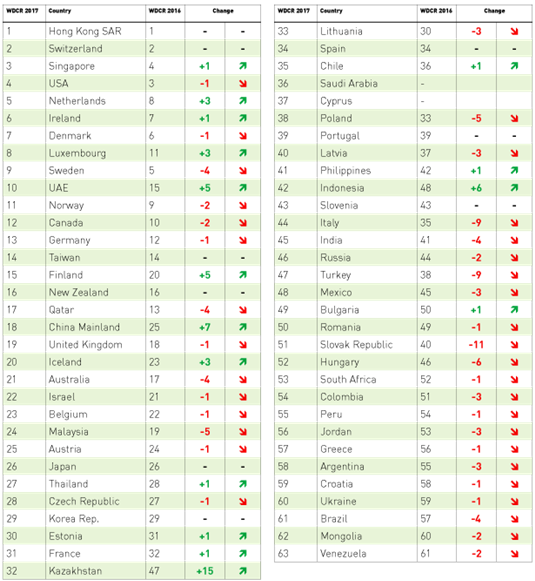

The IMD World Competitiveness Center, a research group at IMD business school in Switzerland, has come out with the 2017 IMD World Competitiveness Yearbook that has Hong Kong occupying the top spot for the second successive year followed by Switzerland and Singapore in the second and third spots.
However, the United States of America found itself pushed to the 4th place from 3rd last year, its lowest position in five years. The Netherlands moved up to 5th rank from 8th in the previous year.
Others in the Top Ten are Ireland in the 6th spot, up 1 place from the previous year pushing Denmark to the 7th rank, Luxembourg climbing 3 spots to occupy 8th rank, Sweden at 9th rank, down by 4 places from 5th rank in the previous year and UAE in the 10th rank, up by 5 spots from the 15th rank in the previous year.
Norway and Canada slipped 2 places to 11th and 12th ranks respectively and Germany went down by 1 spot to rank 13. Taiwan maintained its 14th rank for the second year while Finland moved up 5 spots to 15th place. New Zealand remained at 16 and Qatar came down 4 places to 17th rank.
China made a big leap forward by 8 places to the 18th rank pushing the United Kingdom (UK) by 1 spot to rank 19. Iceland climbed up 3 places to the 20th rank. India slipped 4 places to rank 45 just ahead of Russia that slipped 1 spot to the 46th rank.
The IMD Center has been publishing the World Competitiveness Yearbook every year from 1989 onwards. Compiled with the help of national employment and trade statistics among the 260 indicators, the data has also been garnered from an Executive Opinion Survey. More than 6,250 responses were procured through the survey that measures the business perception of issues such as corruption, environmental concerns and quality of life.
“Singapore and Sweden have developed a regulation that takes advantage of the talent they have by adopting, for instance, a stipulation that facilitates the inflow of overseas talent which complements the locally available pool. The US invests more in developing its scientific concentration and generating ideas but the country has a history of government support for technological innovation.
This year, 63 countries are ranked with Cyprus and Saudi Arabia making their first appearance. IMD World Competitiveness Center Professor Arturo Bris, said in a release that the indicators that stood out among the most improved countries are related to government and business efficiency as well as productivity.
“These countries have maintained a business-friendly environment that encourages openness and productivity…If you look at China, its improvement of seven places to 18th can be traced to its dedication to international trade. This continues to drive the economy and the improvement in government and business efficiency,” he added.
At the bottom of the list are countries experiencing political and economic upheaval. “You would expect to see countries such as Ukraine (60), Brazil (61) and Venezuela (63) here because you read about their political issues in the news. These issues are at the root of poor government efficiency which diminishes their place in the rankings,” he said.
For the first time this year, the Center has come out with a separate report ranking countries’ digital competitiveness. Indicators for technology and scientific infrastructure are already included in the overall rankings. The new Digital Competitiveness Ranking, however, introduces several new criteria to measure countries’ ability to adopt and explore digital technologies leading to a transformation in government practices, business models and society in general.
At the top of the ranking is Singapore, followed by Sweden, the USA, Finland and Denmark. Bris said the countries that achieved high-ranking had the advantage of supportive and inclusive government institutions helping technological innovation.
“Singapore and Sweden have developed a regulation that takes advantage of the talent they have by adopting, for instance, a stipulation that facilitates the inflow of overseas talent which complements the locally available pool. The US invests more in developing its scientific concentration and generating ideas but the country has a history of government support for technological innovation. This shows that in digitally competitive countries, the government must facilitate the adoption of new technologies,” he added.
The Netherlands slipped 1 spot to 6th rank and Hong Kong climbed 4 places to occupy the 7th rank. Switzerland went down 1 place to 8th rank while Canada slipped 4 places to the 9th spot. Norway, down by 1 place got ranked 10th.
Among others, China climbed 4 places to rank 31 and India moved up 2 spots to rank 51.
Many of the top 10 digitally competitive countries are also found at the top of the overall rankings, with some exceptions. Luxembourg, number eight in the overall list, ranks only 20th in the digital list. Finland is 15th in the overall list, but 4th in the digital ranking. “Of paramount importance in the digital ranking are issues related to how adaptive and agile economies are when faced with technological change,” Bris said.
The bottom five are Indonesia, Ukraine, Mongolia, Peru and Venezuela. “One thing the results highlight is that these countries not only have low rankings in terms of talent but they don’t invest in developing whatever talent they have,” he added.
“There is a relation between the lack of talent and training with a lack of business agility…Education and knowledge production are the key,” Bris pointed out.

(Image Source:wikipedia.org)